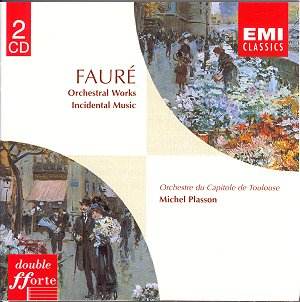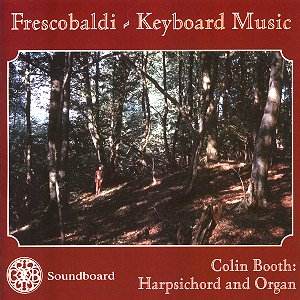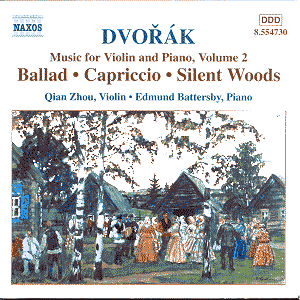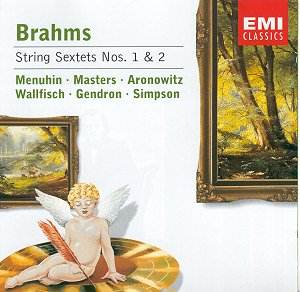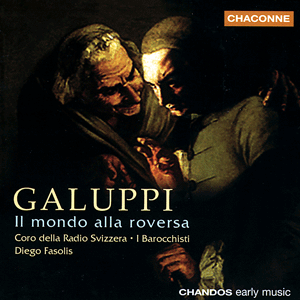 Composer: Baldassare Galuppi
Composer: Baldassare Galuppi
Works: Il Mondo alla Roversa (The World turned Topsy-Turvey)
Performers: Marinella Pennicchi (sop) (Tulia), Rosa Dominguez (mezzo) (Aurora), Mya Fracassini (mezzo) (Cintia), Lia Serafini (sop) (Rinaldino), Furio Zanasi (bar) (Graziosini), Fulvio Bettini (bar) (Giacinto), Davide Livermore (ten) (Ferromonte)
Recording: Swiss Radio Choir, I Barocchisti/Diego Fasolis; recorded at Stelio Molo Auditorium, Lugano, Switzerland, Nov 1998
Label: Chandos
Baldassare Galuppi, an illustrious figure of the 18th-century Venetian operatic landscape, composed over a hundred operas, with “Il Mondo alla Roversa” being a highlight of his collaboration with playwright Carlo Goldoni. This burlesque drama, first staged in 1750, captures the essence of the burgeoning opera buffa genre, providing commentary on societal structures through the lens of comedic absurdity. Galuppi’s deft melding of music and drama is evident, as he explores themes of gender dynamics and power struggles in a fictional island governed by a council of women, setting the stage for an engaging examination of both comedic and serious elements.
The recording by Chandos presents a vibrant interpretation under the baton of Diego Fasolis, whose direction brings out the nuanced interplay between the singers and the orchestra. The Swiss Radio Choir and I Barocchisti deliver a spirited performance, characterized by an adherence to historically informed practices that favor lightness and agility. The soloists exhibit commendable vocal clarity, particularly in the ensemble sections where the interplay of characters’ motives is essential. The casting choices reflect an understanding of vocal color and character differentiation, although some moments lead to a blending of timbres that can obscure individual identities. Notably, Marinella Pennicchi’s portrayal of Tulia stands out; her agile soprano deftly navigates the demands of both lyrical lines and coloratura passages, infusing her character with a charming vivacity.
Furio Zanasi as Graziosini and Fulvio Bettini as Giacinto are commendable in their roles, each bringing a distinct flavor to their respective characters. Bettini’s baritone is particularly effective in conveying the emotional nuances of Giacinto’s predicament, while Zanasi’s lighter timbre complements the comedic elements of the narrative. The two mezzos, Rosa Dominguez and Mya Fracassini, effectively distinguish their characters through varied vocal approaches, with Fracassini leaning towards a darker tone that adds depth to Cintia, while Dominguez’s brighter sound embodies Aurora’s playful nature. However, Lia Serafini’s Rinaldino occasionally falters, with unevenness in the middle register detracting from the overall effect.
The recording quality is exemplary, as is typical of Chandos productions, with a well-balanced sound that allows the intricate details of Galuppi’s orchestration to resonate clearly within the spacious acoustic of the Lugano auditorium. This aspect is vital, enabling listeners to appreciate the subtleties of harmonies and the rhythmic interplay that Galuppi so masterfully crafted. The absence of extraneous noise or audience interruptions further enhances the listening experience, allowing for a deep immersion in the work’s rich textures.
Galuppi’s “Il Mondo alla Roversa” is a vital contribution to the operatic canon, and this recording serves as an excellent entry point for those unfamiliar with his work. The combination of a skilled ensemble, thoughtful interpretation, and high-quality production results in a compelling representation of Galuppi’s operatic prowess. This release not only underscores the significance of Galuppi as a precursor to later operatic developments but also invites renewed interest in a composer whose influence has, until recently, been overshadowed by his more celebrated contemporaries. The recording stands as a testament to the enduring relevance of his music, offering a delightful blend of humor and insight into human relationships.
